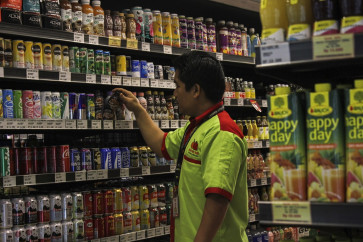Lebanon fuel tank explosion kills dozens as 80 injured
Disaster overwhelms medical facilities as fuel crisis worsens
Change text size
Gift Premium Articles
to Anyone

A
t least 20 people were killed and nearly 80 others injured when a fuel tank exploded in northern Lebanon Sunday, burning crowds clamoring for gasoline in the crisis-hit country.
The tragedy overwhelmed medical facilities heaping new misery on a nation already beset by an economic crisis and severe fuel shortages that have crippled hospitals and caused long power cuts.
"Our teams have transported 20 dead bodies [...] from the fuel tanker explosion" to hospitals, the Lebanese Red Cross said on Twitter.
It added that 79 other people were injured in the blast that took place in the village of Al-Tleil, in the remote northern region of Akkar, one of Lebanon's poorest regions near the border with Syria.
The military said a fuel tank that "had been confiscated by the army to distribute to citizens" much needed supplies exploded just before 2:00 am (2300 GMT). It said soldiers were among the wounded.
The army began raiding gas stations Saturday to curb hoarding by suppliers after the central bank chief announced this week he would scrap fuel subsidies.
The official National News Agency said the blast followed scuffles between "residents that gathered around the container to fill up gasoline" overnight.
Hospitals in Akkar and in the northern port city of Tripoli said they had to turn away many of the injured because they were ill-equipped to treat severe burns.
"The corpses are so charred that we can't identify them," said Yassine Metlej, an employee at a Akkar hospital where seven bodies and dozens of injured were brought.
Hospitals overwhelmed
"Some have lost their faces, others their arms," Metlej told AFP.
At Tripoli's Al-Salam hospital, staff struggled to give first aid to patients before leaving them to rest on stretchers, an AFP reporter said.
Caretaker Health Minister Hamad Hassan instructed hospitals across the country to admit the injured "without reluctance".
Unable to seek treatment in Akkar, Ismail al-Sheikh, 23, who sustained burns to his arms and legs, was driven by his sister Marwa to the Geitawi hospital in Beirut.
"At night, we were informed that the army was distributing gasoline... so people flocked to fill it in plastic containers... straight from the tank," Marwa told AFP.
"Most of the people who were there said that someone had thrown a lighter on the floor" causing a fire that sparked the explosion, she added.
Other eyewitnesses claimed that shots were fired before the blast.
Lebanon, hit by a financial crisis branded by the World Bank as one of the planet's worst since the 1850s, has been grappling with soaring poverty, a plummeting currency and dire fuel shortages.
Central bank governor Salameh said Wednesday the lender cannot afford to fund fuel subsidies due to dwindling foreign reserves, and accused importers of hoarding fuel to sell it at higher prices on the black market or in Syria.
Fuel shortages have left many with just two hours of electricity a day, while several hospitals have recently warned they may have to close due to power outages.
The American University of Beirut Medical Centre, the country's top private hospital, said it would close by Monday morning if it doesn't secure diesel to power generators.
It warned that this would cause hundreds of deaths.
Search for missing
Lebanon's President Michel Aoun called for an investigation into the circumstances that led to the blast.
At the blast scene, soldiers and rescuers swept the area to search for missing people, as relatives gathered in anguish, state media said,
The Akkar explosion comes less than two weeks after Lebanon marked the first anniversary of a blast at Beirut port last summer that killed more than 200 people.
On Aug. 4, 2020, a haphazardly stored stock of ammonium nitrate fertilizer exploded and left swathes of the capital resembling a war zone.
It was one of history's largest non-nuclear explosions.
In the year since, no officials have been held to account for that blast.
Despite the economic crisis, political wrangling has delayed the formation of a new government after the last cabinet resigned in the wake of the port blast.
International donors have pledged hundreds of millions of dollars in humanitarian aid, but the funds remain contingent on a new government being formed to spearhead reforms, and on talks restarting with the International Monetary Fund.









